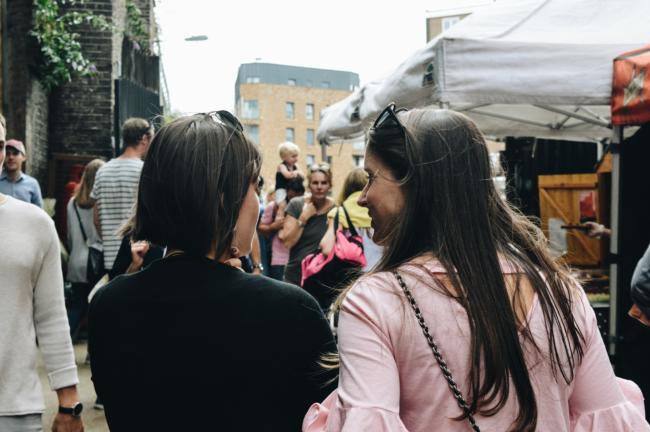How to overcome your worries with self-care
Guest post by Holly Ashby from London Beeja Meditation Centre
It can be frustrating and, at times, quite scary to be short of money – especially if you live in a city like London. Whether it’s receiving a late notice for your council tax, finding out you have to make £37 last two weeks or falling behind on rent, the experience of having no money in a notoriously expensive city can be pretty stressful. While it makes sense to be aware of your financial situation, endless worry won’t improve your circumstances, but it will impact your wellbeing – which is why learning to manage money stress is really important.
London Money Worries
It’s hard to imagine what it feels like to be truly skint until you experience it for yourself – and once you find yourself in the position of agonising over how to spend 70p at the local supermarket, you fervently hope that one day soon you’ll get to find out what it’s like to be luxuriantly wealthy instead. When you have limited cash, your options can feel limited too, and worries about bills and the expense of everyday life in London can become all-consuming.
By following a few self-care tips, you can ensure that rather than becoming lost in a fog of self-blame and rumination, you instead think clearly and calmly about your situation. This way, you can both make the best choices for yourself and stop money from becoming the dominating concern in your life.
Make meditation part of your day
With the benefits of reduced stress and greater clarity, there are many different ways that you can make meditation part of your life. Money stress can seep into every area of your life – keeping you awake at night, making you feel run down and monopolising most of your waking thoughts.
Meditation can help you take back control over the way you feel and help you become happier, even under pressure. Research suggesting that meditation can reduce your level of stress hormones and even reduce the density of the “stress centre” (known as the amygdala) within the brain, while increasingly density in areas associated with learning and cognition.
There’s Youtube tutorials, reams of written material and plenty of free or inexpensive apps to choose from when introducing meditation into your day. Another way to begin a meditative practice is by getting into the habit of doing a few breathing exercises (you can find guides from the NHS, anxiety charities and health professionals online) when you are feeling panicky.
Something you can try while reading this article is noticing any facial tension you may be carrying. If your brow is furrowed, try smoothing your forehead, and if you are clenching your teeth, consciously relax your jaw. You might be holding your shoulders up towards your ears – in which case, draw them down. Taking a moment to notice how any stress is being translated into your body can help to bring you into the present moment, and help you to relax.
Keep on socialising and being active
It’s very important, when experiencing difficulties in life, to try to avoid a “downward spiral” of events, where one misfortune or challenge creates a series of knock-on effects. If you feel that you can’t see your friends or visit family due to lack of spending money, this can lead to social isolation, which can in turn lead to increased feelings of depression.
It may be more of a challenge, but don’t let money worries stop you from seeing your friends, and try not to feel guilty for asking them to adjust plans in light of your financial constraints – such as going for a walk in the park rather than out for an expensive lunch. Having limited funds certainly may stop certain forms of socialising, but there’s lots of ways to enjoy the company of your family and friends in a budget-friendly manner.
You can explore the rest of BrokeinLondon’s blog for hundreds of ideas, including how to get enough exercise and meet new people through fitness groups. Even if it’s just watching TV at a mate’s house or talking to your mum over a video call, staying in touch with loved ones is a vital way to remain happy and healthy, while regular exercise has well-documented mental health benefits.
Don’t avoid the issue
Inaction tends to feed anxiety. Whether it’s phoning the council to sort out a new payment plan for your council tax or taking steps to consolidate your debts, you will probably find that facing the issue head on helps you put an end to spiralling negativity. It’s only natural to worry if you aren’t sure how you’re going to make your money last the month, but there’s a difference between useful worry (the sort that proceeds a sensible reaction to circumstances) and a sense of pervading dread that simply never lets up.
One strategy you can use is planning your finances so, as far as is possible, you can go on “financial autopilot”. For instance, it can be a real stress going around a supermarket trying to work out what you can afford, but resources like Cooking on a Bootstrap can help you plan meals and define a weekly shopping list, removing that element of uncertainty.
Try to pursue hobbies
When money is tight, it’s understandable that anything not considered essential can be put way down the priority list. However, the things that make you feel relaxed and happy are important too, and just because you don’t have a vast amount of disposable income doesn’t mean you shouldn’t allow yourself enjoyment in life. Furthermore, channelling your energy into positive habits it will help you avoid unhealthy coping mechanisms that ultimately make you more stressed out.
Many pursuits are (or can be adapted to be) cheap or even free. If you are a voracious reader, libraries and second hand book shops are wonderful places to wile away your time, while the plethora of free apps and online resources makes everything from mastering a new language to learning how to code easy to pursue in your spare time.
Art materials and fancy notebooks might be pricey at times, but drawing, writing, blogging or journaling are all totally achievable on a budget. For example, you could set yourself a 30-day drawing challenge with nothing but some paper and a biro, or start a photo journal using your phone and a Instagram account.
Whatever it is that interests you, the main thing is to make some time for you, regardless of money. It may be something you have to take into account, but lack of money shouldn’t be the only thing you think about, or something that makes your life miserable. By reminding yourself that you are allowed to look after yourself and dedicating some time to self care, you’ll protect your wellbeing while being broke in London.
About Holly Ashby
Holly works at the London meditation centre Beeja meditation, where the Beeja team help people manage their stress and anxiety through meditation.






